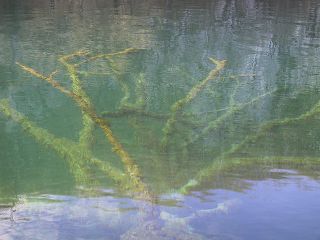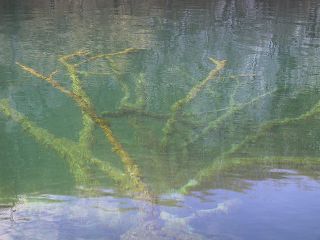
If you’ve read my article on aquatic vegetation, then you’ve already learned about all the ways to pick apart weeds to find and catch fish. Now, I’m back to shed some light on another common cover found in bodies of water: wood. Some call this structure, but wood is still classified as cover. Structure consists of permanent features, such as reefs, islands, and points, while cover is non-permanent objects like docks, weeds, and fallen trees. Whatever term you use to describe it, the simple fact is this: submerged timber is a fish magnet, and learning how to fish it right will turn you into a fish’s worst nightmare.
Submerged logs, standing timber, fallen trees, docks, and other objects make up this category and when you see such targets, fish them. They can be a little more difficult to fish, as docks and trees tend to be less forgiving than weeds, especially if you find yourself snagged. Of course, snags are as much a part of fishing as casting and hooking a fish. To help you out, however, here are a few tips to remember when fishing timber, docks, and other bits of cover:
Timber, commonly found near reservoirs, requires quality gear and precise angling. Buzzbaits and spooks work well in these situations when you’re faced with low light or overcast skies. If you’re fishing sparse timber and have some room to work with, spinnerbaits will work well, and if you’re careful, so will crankbaits. When faced with dense timber, try flipping jigs or Texas-rigged plastics like worms and craws.
If you’re fortunate enough to stumble upon fallen trees, then you’ll have a variety of options when it comes time to choose a lure for these fish havens. Topwaters work well, as will spinnerbaits or crankbaits fished over the tops of the branches. Jigs equipped with brush-guards and other weedless baits will work well, too. Be prepared for a fight, however, as fish tend to wrap the line around the intricate branches of fallen trees when hooked.
If you’ve ever watched a bass tournament on television, you’ve undoubtedly seen anglers seeking out docks throughout the day. There’s a reason for this; docks are notorious for concealing trophy fish. The key is learning to close in on a dock with stealth, which will deter you from spooking any fish residing there. Try to work the edges of docks with long casts form further out first, then move in quietly with short flips and pitches to specific locations. Remember to use weedless lures if possible and retain from dinging any property, and the owners won’t mind the activity.
Lastly, you’ll likely find objects such as tires, barrels, and even the occasional sunken ice shanty out on the lake. Take some time and make a few casts to such targets, as they are known to sometimes hold keepers. My only other advice is to invest in a good pair of polarized sunglasses, as their ability to allow you to see into the water is irreplaceable. Being able to see the cover is imperative to fishing it and will enable you to better understand how fish relate to it for future reference.
Fishing cover such as weeds and fallen trees can be a little intimidating at first, but all it takes is practice and some time to understand how and why fish relate to a particular piece of cover. Once you learn that, then the ability to better fish such locations will be as easy as aim, cast, and set the hook.








